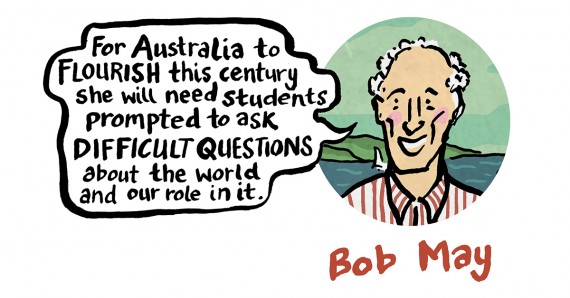The best gift I ever received came from a most unexpected source — a high school teacher named Lenny Basser.
It is beyond any doubt that I owe my own happy (and hopefully useful) career to Lenny Basser, my chemistry teacher at Sydney Boys High School in the early 1950’s.
I was then a member of Sydney Boys’ excellent debating team, and we won essentially every inter-school competition we entered into. This meant all the advice I received from the school’s career advisers was that I should become a lawyer.
That all changed with a chemistry class that set my life and career on a different path.
Lenny Basser began his chemistry course by doing something I suspect many teachers would like to do even today — throwing out the textbook (metaphorically of course). He suggested all the people in the honours class were likely to go to university, and therefore his job was not primarily to teach a syllabus but to teach each of us how to ask the right questions and go about fully educating ourselves.
He taught us by not teaching us. Or, more specifically, he taught us not by asking us to memorise knowledge, but by challenging us to learn how to think.
You will, of course, recognise that this is a most unfamiliar way of approaching teaching, and some students really disliked it. Others, like me, thought it was excellent.
I loved it so much I gave up the prospect of what I saw as a much less interesting career in law.
Instead, I pursued life as a scientist, doing work in the spirit suggested by Lenny Basser’s teaching. In his way, he guided me — or allowed me to guide myself — along the first steps of a journey that led to my becoming President of the Royal Society, and to many wonderful people, places and subjects.
This is not just my story. Years later I learned Lenny Basser had taught eight fellows of the Royal Society. One was Australian Nobel Laureate John Cornforth — who, when accepting the Nobel Prize in 1975, highlighted the singular influence of one man, Lenny Basser, in inspiring him to pursue a career in science instead of one in law.
By the way, Lenny Basser wasn’t just a chemistry teacher. For 28 years he also coached the track team. Whether it was sport or the stock market, Lenny Basser was ahead of the curve in new techniques and motivating people.
I do realise that this “gift from Santa” may seem a bit oddly-put, if narcissistic. But what I wish to convey is that, in later years at high school, very systemic thought should be given to the way we teach. We should not simply teach a syllabus and ask students to memorise facts, but rather teach students to think for themselves, and to ask themselves questions about what they’re being taught.
Albert Einstein wrote that schooling is not “simply the instrument for transferring a certain maximum quantity of knowledge to the growing generation” but should develop “those equalities and capabilities which are of value for the welfare” of the community at large. Einstein wanted education to grow minds so that one didn’t become “a mere tool of the community, like a bee or an ant”.
In Australia we can sometimes be a bit like Einstein’s bees and ants, too fixated by what is on the syllabus. We can undervalue teachers and overestimate powerpoints — not just at school, but at TAFE and university too.
Education is about more than debating points and the syllabus. It is about facts, of course. But these facts can change. Climate change wasn’t on my school syllabus and is now the most important question we face.
What is really needed in good schools is more people like Lenny Basser. That is to say, teachers who do not simply regurgitate the textbooks, but those who motivate students to think for themselves.
To put it another way, I believe it is hugely important for students to be guided towards going outside the box, to ask questions about what is going on, not only in science but more generally as well.
Teachers like Lenny Basser have prompted people not just to think, but to act — and perhaps to devote careers to things that enhance the greater good.
These lessons are more important than ever. The world will always need lawyers, as it will need scientists. But for Australia to flourish this century we will also need students prompted to ask difficult questions about the world and our role in it.
Most of all, we will need self-sufficient learners (and thinkers) in an ever-growing sea of information.
This would be the most powerful gift of all.
—
Lord Robert May is a former President of the Royal Society and Chief Scientific Adviser to the UK Government. He is currently Professor at Oxford University, and a member of the UK Government’s Climate Change Committee.
This is the second piece in CPD’s ‘Secret Santas for Australia’ series. Each day we will reveal one ‘gift’ of good ideas from a prominent Australian on a policy issue close to their heart. You can see the full set here.

